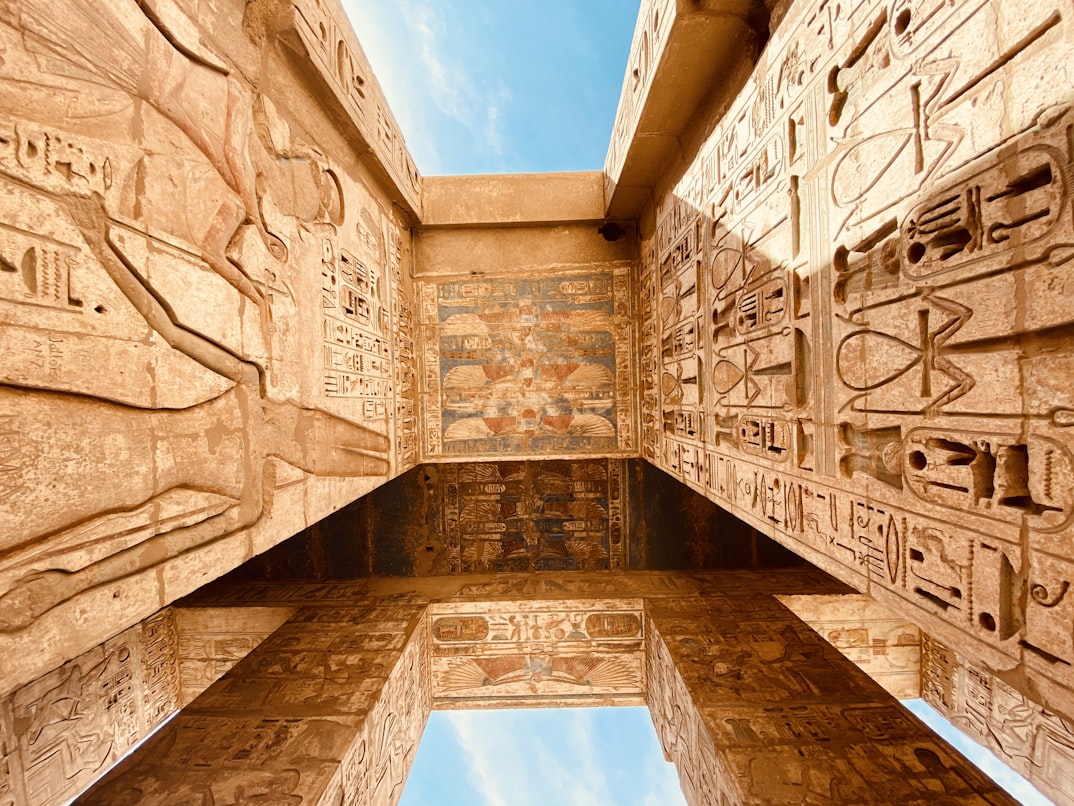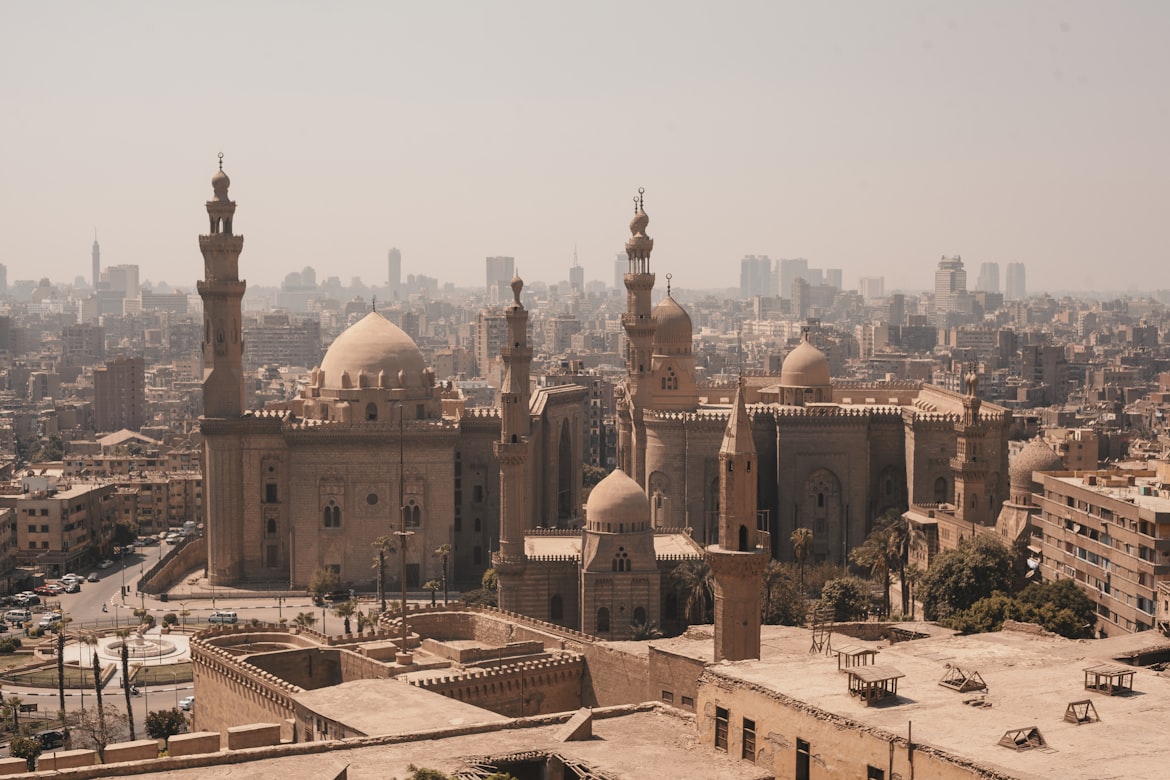Top Attractions
Egypt offers a treasure trove of iconic landmarks that span millennia of history. The Giza Pyramid Complex near Cairo is the country’s most famous attraction, featuring the Great Pyramid of Khufu, the Sphinx, and several smaller pyramids. Luxor, often referred to as the world’s greatest open-air museum, is home to the Valley of the Kings, where tombs of pharaohs like Tutankhamun were discovered. The temples of Karnak and Luxor offer intricate hieroglyphics and massive columns that showcase ancient Egyptian architectural prowess. In Aswan, travelers can marvel at the beautiful Philae Temple and take a short trip to see the colossal Abu Simbel temples built by Ramses II. For a more relaxed experience, a cruise along the Nile River offers a scenic journey through both history and daily life. In northern Egypt, the coastal city of Alexandria charms visitors with its blend of Greco-Roman ruins and Mediterranean flair, including the historic Catacombs of Kom El Shoqafa and the modern Bibliotheca Alexandrina.
Local Dishes
Egyptian cuisine is hearty, flavorful, and rich in vegetarian options. One of the country’s most beloved dishes is koshari, a filling mix of rice, lentils, pasta, and crispy onions topped with a tangy tomato sauce. Ful medames, slow-cooked fava beans typically served with olive oil, garlic, and lemon, is a traditional breakfast staple. Taameya, Egypt’s version of falafel made with fava beans, is usually enjoyed in sandwiches with fresh vegetables. Grilled meats like kofta (spiced ground beef or lamb) and kebabs are commonly served with flatbread and tahini sauce. Molokhia, a green leafy stew, is typically served with rice and chicken. For dessert, try basbousa (a semolina cake soaked in syrup) or konafa, a shredded pastry filled with cream or nuts.
Transportation Tips
Getting around Egypt can be an adventure in itself. In major cities like Cairo and Alexandria, taxis are plentiful, but it's best to agree on a fare in advance or use a ride-hailing app like Uber or Careem. Cairo also has a reliable and inexpensive metro system that can help you avoid traffic. For long-distance travel between cities like Cairo, Luxor, and Aswan, trains operated by Egyptian National Railways offer a comfortable and scenic option, especially the overnight sleeper trains. Domestic flights are convenient for covering large distances quickly. Within cities, microbuses and tuk-tuks are common but can be confusing for first-time visitors due to the lack of schedules or official stops.
Budget Travel Tips
Egypt is one of the most budget-friendly destinations in the Middle East and North Africa. Street food is not only delicious but also very cheap, allowing you to sample local cuisine without breaking the bank. Entrance fees to historic sites can add up, so consider getting a multi-site tourist pass or student discounts if eligible. Public transportation, such as the metro and local buses, is extremely affordable. Bargaining is expected in markets and even with some taxi drivers, so don’t be shy about negotiating prices. Budget accommodations, especially in places like Luxor and Dahab, offer excellent value for money.
Safety Info
Egypt is generally safe for tourists, especially in well-trodden areas like Cairo, Luxor, and Aswan. However, it's important to stay updated on travel advisories and avoid remote areas near borders, particularly with Libya and Sudan. Scams targeting tourists are common, especially at popular sites, so be cautious when dealing with unofficial guides or vendors. Always use registered tour operators and keep a copy of your passport on you. Solo female travelers may receive unwanted attention, so dressing modestly and joining guided tours can enhance comfort and safety.
Cultural Etiquette
Egypt is a conservative, predominantly Muslim country, so modest dress is expected, especially in religious sites and rural areas. It’s customary to greet people with “Salam Alaikum” (peace be upon you) and accept tea if offered as a gesture of hospitality. Public displays of affection are frowned upon, and it’s polite to use your right hand when giving or receiving items. During Ramadan, eating and drinking in public during daylight hours should be avoided out of respect. Tipping, or “baksheesh,” is customary and appreciated for most services.
Travel Style Fit
Egypt is an excellent destination for cultural enthusiasts, history buffs, and photographers captivated by ancient wonders. It also appeals to adventure travelers interested in diving, desert excursions, or Nile cruises. While not ideal for those seeking modern nightlife or luxury shopping, Egypt’s unique blend of historical grandeur, religious heritage, and natural beauty makes it perfect for experiential and educational travelers. Solo adventurers, couples, and families with older children will all find Egypt to be a memorable and enriching destination.

Best Time to Visit
The best time to visit Egypt is during the cooler months from October to April, when daytime temperatures are more comfortable for exploring outdoor sites. December and January are the peak tourist months, especially around Christmas and New Year, so popular attractions can be crowded. Spring (March to April) and autumn (October to November) offer a good balance of pleasant weather and fewer tourists. Summer (May to September) can be oppressively hot, particularly in southern Egypt, making sightseeing more challenging.
Accommodation Recommendations
For low-budget travelers, Dahab Paradise in Dahab offers an affordable, scenic option with Red Sea views and a relaxed vibe ideal for backpackers and divers. In Luxor, the Nefertiti Hotel is another excellent budget choice, with rooftop views and proximity to major historic sites.
For mid-range comfort with a touch of luxury, Steigenberger Nile Palace in Luxor offers riverside rooms and excellent dining, while Cairo’s City View Hotel provides great access to the Egyptian Museum and Tahrir Square.
Luxury travelers will find exquisite accommodations at the Marriott Mena House in Giza, which boasts pyramid views and lavish amenities. The Oberoi Philae Nile Cruise provides a 5-star floating experience with gourmet dining and spa services. In Aswan, the Sofitel Legend Old Cataract Hotel delivers colonial elegance and top-tier service.
Languages Spoken
Arabic is the official language and widely spoken throughout Egypt. Egyptian Arabic is the most commonly used dialect. English is spoken in most tourist areas, hotels, and by guides, though outside major cities, communication may require more gestures and basic Arabic phrases.
Currency
The official currency of Egypt is the Egyptian Pound (EGP). While credit cards are accepted at many hotels and upscale restaurants, cash is king in markets, local eateries, and for tipping. ATMs are widely available in cities and tourist areas, and it’s advisable to carry small denominations for daily transactions.
Common Traveler Mistakes to Avoid
A common mistake is underestimating how large and spread-out Egypt is, leading to overly ambitious itineraries. Many travelers also forget to bring enough small change, which is essential for tipping and small purchases. Drinking tap water is not recommended, so always carry bottled water. Some visitors neglect to dress appropriately for religious sites or are unaware of local norms, which can lead to discomfort or unwanted attention. Lastly, skipping a guided tour at major archaeological sites can mean missing out on valuable historical context.
Essential Apps & Tools
Uber or Careem for reliable rides in major cities, Google Translate for quick Arabic translations, and maps.me or Google Maps for navigation are very useful. XE Currency helps with live exchange rates, while TripAdvisor and Booking.com offer helpful reviews and accommodation booking. For museum guides and site interpretation, downloading an offline travel guide app like Lonely Planet or Egypt Travel Guide (by GuidePal) can greatly enhance your experience.
Suggested Itinerary Styles
A well-balanced Egypt itinerary typically starts in Cairo, exploring the pyramids and museums before heading south via sleeper train or flight to Luxor and Aswan. A Nile cruise between these cities offers a luxurious and seamless way to see temples and towns. Adding time in Dahab or Sharm El Sheikh on the Sinai Peninsula gives you a relaxing beach finish, ideal for diving or unwinding. Allocate at least 10 to 14 days to fully appreciate the historical depth and regional diversity.
Fun Facts
Egypt is home to the only remaining wonder of the ancient world—the Great Pyramid of Giza. The Nile River, the longest river in the world, has been the lifeblood of Egyptian civilization for over 5,000 years. Cleopatra VII, the last active ruler of the Ptolemaic Kingdom, wasn’t Egyptian by blood—she was of Greek descent. Egypt introduced one of the world’s earliest forms of paper, papyrus, which revolutionized communication and record-keeping.
